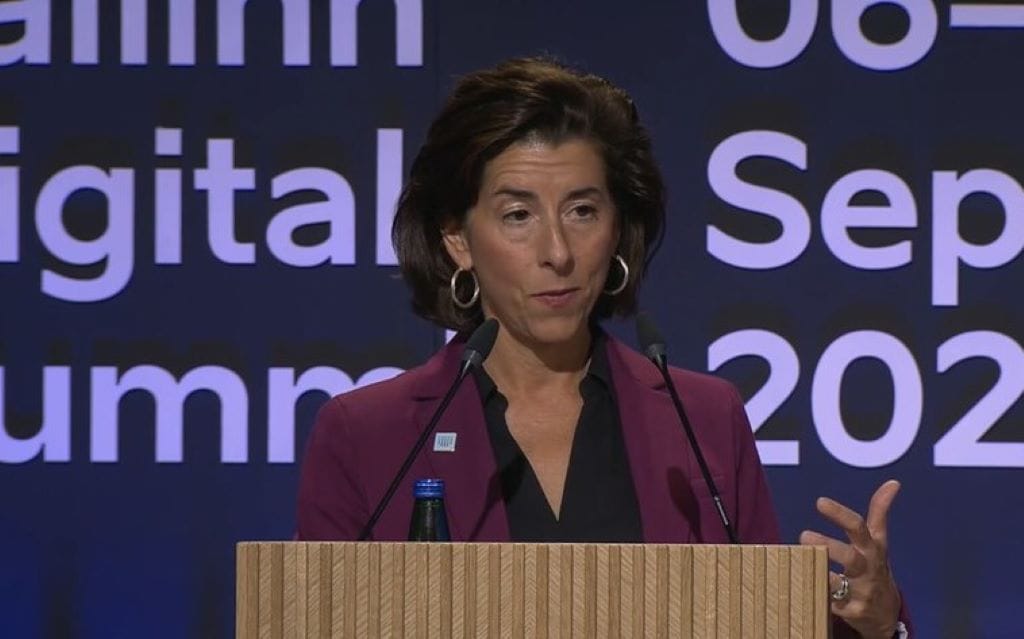Innovation Fund Opens, USCellular Social Media Limit Mode, UTOPIA Fiber’s Yearly Report
This $1.5 billion was funded by the CHIPS and Science Act of 2022.
Tim Su

April 13, 2023 – Commerce Secretary Gina Raimondo announced on Wednesday the opening for applications of the Public Wireless Supply Chain Innovation Fund, a $1.5 billion fund intended to help develop open and interoperable networks.
The money will go toward wireless equipment that can work with equipment from other companies, as opposed to a single proprietary system from one supplier. This type of open technology has been touted by experts and agency officials as a means to make more affordable and secure the country’s networks.
“The Innovation Fund is a critical step toward securing 5G wireless networks while driving innovation at home and abroad,” said Raimondo. “Investing in the next generation of innovation will unlock opportunities for new and emerging companies to compete in the global telecom market, strengthen our telecom supply chains and provide our allies and friends with trusted choices and innovative technologies to compete in the 21st Century.”
Applications are due June 2, with awards expected to be allocated in August.
The National Telecommunications and Information Administration, which announced the launch of the consultation into the fund last year, said it will support research areas in expanding testing and evaluation to effectively facilitate and assess the interoperability, performance, and security of standards-based 5G open radio access network.
The fund received money from the CHIPS and Science Act of 2022, which became law last year.
USCellular announces feature to limit social media use
Mobile wireless company USCellular announced on Wednesday it has introduced a new feature called “US Mode,” which in part allows individuals to limit social media use.
The settings of US Mode allows cellphone owners to include time restrictions on social media apps, disable non-human push notifications, eliminate red notification bubbles for apps, enable pre-set quiet times, and customizing app displays.
“As technology has advanced, it’s become apparent, that we’ve entered a time where we need to reset the relationships with our smartphones,” said Eric Jagher, senior vice president and chief marketing officer at UScellular. “It can mean completely disconnecting for a period of time or using the tools we’ve created through US Mode to create that balance. Either way, we want to be that catalyst for people to get back to US and building better relationships with technology.”
The features come as Washington and the states grapple with the harms caused to young Americans by excessive social media use. As lawmakers urge crack downs on Chinese-owned video-sharing app TikTok, the app introduced a default time limit of one hour for users between the ages of 13 and 17. The setting, which can be applied to a certain amount of time for all users, can be toggled off.
A social media law in Utah, the most restrictive in the country, forbids the use of social media by minors between 10:30 p.m. and 6:30 a.m., which can be adjusted with parental permission. The rules, which passed into law this year, take effect next March.
UTOPIA recaps fiber deployment
UTOPIA Fiber last year plowed more than 4,387 miles of fiber infrastructure across Utah, Idaho and Montana, completing fiber buildouts in 14 cities, and adding 20,000 Gigabit customers, including speeds of 10 gigabits per second, according to a press release.
“What we’re seeing here is that cities want to be ready for what’s to come,” said Roger Timmerman, executive director of UTOPIA Fiber. “There’s increasing competition among cities and regions for talent, opportunity, and a better quality of life for all residents. Cities with UTOPIA Fiber are incredibly well-positioned for the future. Fiber is the infrastructure that drives the digital economy, supports advanced wireless, and enhances quality of life through seamless streaming, gaming, and other high-bandwidth applications,” he said.
According to the company’s customer survey from last year, nearly half of the 2,500 participants said they chose speeds of 1 Gigabit per second or higher. The survey found that 43 percent of respondents chose the gigabit speeds or higher, with 95.8 percent saying internet speed was either “extremely important (64.94%) or “very important (27.7%),” according to the results.











Member discussion